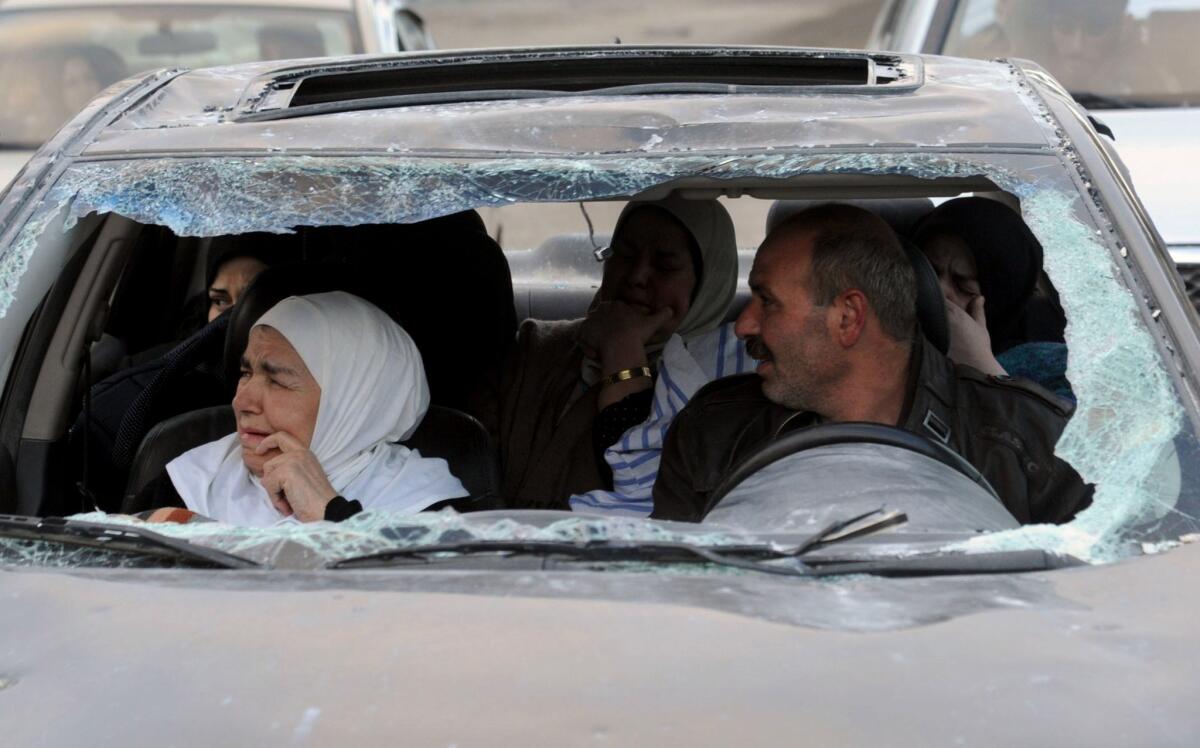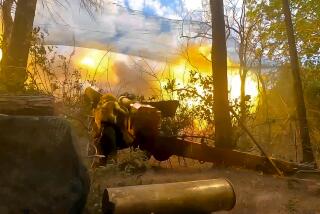Syrian army reportedly seizes third town along key north-south highway

BEIRUT – Syrian government forces have regained control of a strategic town along the nation’s major north-south highway, state media reported Monday, as troops advanced in a sweeping offensive designed to secure the route and sever opposition supply lines from nearby Lebanon.
The dangerous highway is expected to be used as a corridor for the transport of Syria’s toxic stockpiles as part of a United Nations-backed plan to rid the country of its chemical armaments.
State news outlets reported that government forces had established “full control” of Nabek, about 50 miles northeast of Damascus along the highway, which links the capital to the central city of Homs.
Nabek was once home to about 50,000 people, but most are reported to have fled. News reports indicate the town was heavily damaged in weeks of fighting and shelling.
Nabek is the third town reported captured in recent weeks along the strategic corridor as government forces reportedly backed by Lebanese Hezbollah militiamen push an offensive in the mountainous Qalamoun area along the border with Lebanon. The army had previously established control of the towns of Qara and Deir Attiyeh.
An opposition representative reached via Skype said rebel forces had withdrawn from the area of the highway in Nabek, but that hit-and-run battles were ongoing inside the town.
The fighting in the Qalamoun district has prompted thousands of refugees to flee into Lebanon, which already houses more than 1 million Syrians displaced by the war. Multitudes of people forced from their homes face harsh conditions as a cold snap descended on the region and winter approaches.
The military’s strategic aims appear twofold: to sever opposition supply and reinforcement lines from Lebanon and secure the main highway. The road is a crucial artery for the transport of fuel, food and other provisions to and from the capital.
The highway had been reported cut in recent weeks because of heavy fighting in the Qalamoun area. A number of army checkpoints and outposts are situated along the route, but several stretches are isolated and subject to rebel attack and ambush. A least one city near the highway, Yabroud, remains under opposition control.
The Damascus-Homs highway, which connects to the principal road to Syria’s Mediterranean coast, is also expected to be utilized to evacuate chemical stocks under a U.N. mandate to eliminate Syria’s toxic armaments.
Officials are considering a plan to transport the toxic material overland to the coast, then ship it off for destruction outside the country. Syrian authorities are cooperating with the plan, but securing the highway remains a key hurdle. The disarmament plan grew out of a U.S.-Russian agreement that averted threatened U.S. airstrikes in retaliation for chemical attacks in August that reportedly killed hundreds of people in the suburbs of Damascus.
On Monday, Ahmet Uzumcu, the former Turkish diplomat who heads the Hague-based Organization for the Prohibition of Chemical Weapons, acknowledged it would be difficult to move all 500 tons of Syria’s most toxic chemical weapons stockpiles out of the country by the Dec. 31 deadline.
“This is very challenging, especially in view of the security situation, which is worsening,” Uzumcu told journalists in Oslo, where the organization is receiving the Nobel Peace Prize for its work in eliminating chemical weapons worldwide.
The latest fighting comes as Syrian forces consolidate gains against opposition forces in advance of a planned peace conference scheduled for Jan. 22 in Geneva. The upcoming talks, backed by Russia and the United States, are to mark the first time that government and opposition forces have negotiated together since the Syrian conflict erupted more than 2 1/2 years ago. More than 100,000 people have died in the civil war and more than 6 million people have been forced from their homes, according to U.N. estimates.
ALSO:
Venezuela’s ruling socialists survive electoral test
North Korean ouster could bring more political turmoil
Russia: Putin dissolves, replaces Soviet-era news agency
Twitter: @mcdneville
Times staff writer McDonnell reported from Beirut and special correspondent Bulos from Dubai, United Arab Emirates.
More to Read
Sign up for Essential California
The most important California stories and recommendations in your inbox every morning.
You may occasionally receive promotional content from the Los Angeles Times.











